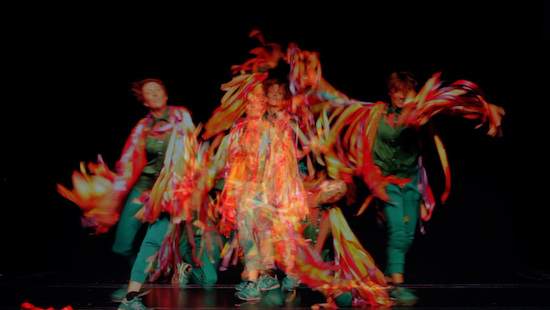You can tumble and fly right through this album, from beginning to end, without stopping. The tracks are strung together, alive. It begins with ‘Incantation For An Inanimate Object’, a song that lasts less than two minutes and stirs you in such a way that you’re reminded of things you have never seen and places you haven’t been, while lowing voices and peripheral rattles promise to raise spirits or at least create thrumming energy in the earth. We’re off.
‘Spinning Dance’ plays with time too – it swirls and chants, carries you along, with a frantic melody on top of speeding and slowing rhythms. You’re not quite sure where or when you are. Then it deposits you gently, politely at ‘Pass Through The Fire’, the lead single, which tiptoes in on a sweet little organ sound and then bangs hards with storming brass and batshit synths. There is skronk here, excitement, communion. We’re flying.
James Holden has always worked as part of a network of friends and musicians (he even called his East Anglia record label Border Community) but his taste for collaboration seems to have rocketed since he worked with Moroccan gnawa master musician Mahmoud Guinia a few years ago. And with that taste for collaboration comes experimentation, improvisation, generosity, trust. All the good stuff. He’s working with a live band now, this album was all recorded in single live takes. A lot of it is improvisation and with that comes a delicious combination of control and freedom. All the lessons of free jazz and improv are being learned here, listening, taking your space, leaving space, repetitions and variations. It seems very likely that James Holden will be at the Pharoah Sanders gig at The Barbican in a couple of weeks, and maybe at the Alice Coltrane Ashram Project too. (Pharoah Sanders played with Guinia too, 20 years ago, and about 20 years before that Ornette Coleman was visiting the Master Musicians Of Joujouka in northern Morocco.) Holden is adoring and hailing these amazing musicians, seeing their lineages and creating his own. He’s also strengthening and continuing the connections: Mahmoud Guinia died two years ago, but next week his son Maâlem Houssam Guinia plays with Holden at Le Guess Who? festival in Utrecht.
It’s quite a feat to create something so universal, something that uses so many influences to push outside of time and place, without erasing any of the specifics. There are risks with magpie-ing other people’s musical cultures, and Holden has talked about them: “Do you take this foreign music and squash it into your paradigm? Is that okay to do that? … No, it would really disrespectful… It has to be a meeting in the middle… Otherwise, it’s going to be something offensive, exoticism.” It works – this is a meeting of so many people, ideas, energies, “maximum individualism within the framework of spontaneous egalitarian interaction,” as jazz musician George Lewis wrote, and it is wonderful.
Holden’s own lineage so far is in dance music, in trance, and when he meets in the middle of these spiritual jazz and folk trance influences there’s all kinds of glimpses of English raver history in there too. It’s a series of rave palimpsests where something is a bit Vangelis, a bit Guru Josh, a bit theme from The Equalizer, layered with playfulness of improvisation, thoughtfulness, the tenderness of finding your way, a melancholy, a dappled sense of space between trees, a pulsing rave bassline and a sapling branches whipping through the air. It is organic, but then raves weren’t all in nightclubs and the countryside isn’t all placid idyll; there are strange things going on, neither good nor bad, jittering, skidding, lumbering and rising, in communion and heading beyond.
One of the many clues as to how jazz and rave share spiritual DNA is the fact that the very best Youtube comments are underneath the classic rave tunes and the really great jazz. The rave ones will mention doves and whizz more often, while the jazz ones are perhaps more likely to discuss who was playing piano in that particular session, but whether it’s a response to Coltrane or N-Joi, they all talk a lot about love, gratitude, and being together across time and space. There’s a giddiness and a generosity. The essence is in this, (from MrBallair): “If I had a time machine I would go back there, never have I witnessed such euphoria, friendship and true love for the music.”
This album is full of "euphoria, friendship and true love for the music". Time has collapsed, or it’s going round and round, or it keeps changing its mind – you can hear it in the music and you can see it from the song titles: ‘The Beginning & End Of The World’, ‘The Neverending’, ‘Each Moment Like The First’. Like the gnawa musician, like jazz improvs, like old ravers on Youtube, Holden and his band – the Animal Spirits – are playing with time, poking at it softly, seeing what happens, trusting and listening, and dancing. You can feel it in ‘Thunder Moon Gathering’, with its full frenzied skronk and soaring juddering beats; by the end of the track you’re breathless, wondering where you’ve been and what you got up to there. And then the final song, ‘Go Gladly Into The Earth’, is so soft and playful, it’s a crooning, swinging lullaby – does the title make it sinister, or is there a lovely matter-of-factness to it? The players leave one by one, like Von Trapp children singing adieu, the percussion alone and fading, one last soft plonk on the keyboard, and a tiny final exhalation. Good night.



